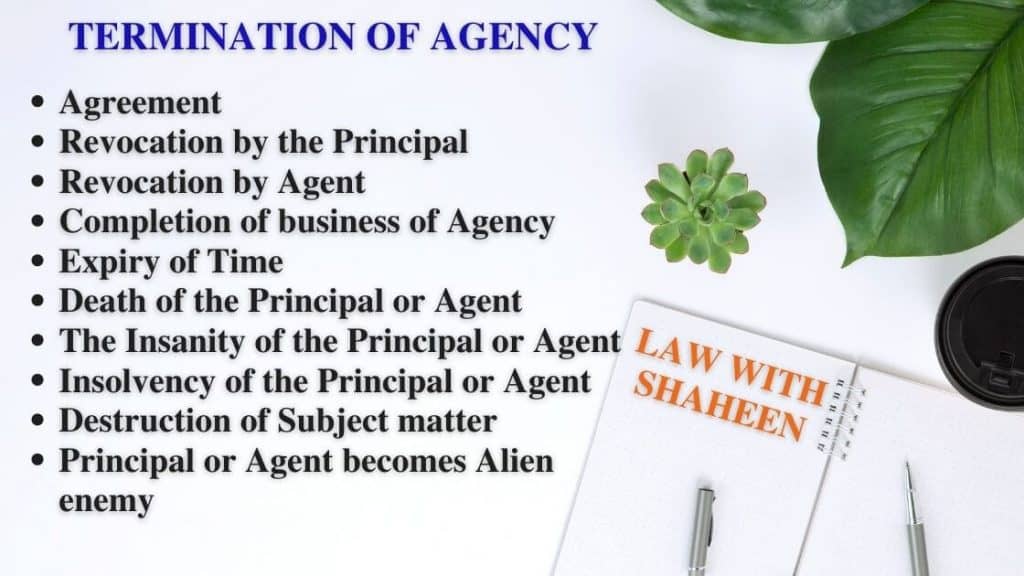A contract of agency is a two-party relationship in which one person acts as a representative to the other in business dealings in order to create contractual relations between that other and a third person.
An agency may be created to perform any act that the creator of the agency himself could lawfully do.
Table of Contents
Relevant Provisions:
Section 182 to 187, 196, 201 to 219,221 to 223,225, and 273 of the Contract Act, 1872.
Definition of Agency in Contract Act:
Section 182 of the Contract Act 1872 defines the term Agent and Principal as; “An agent is a person employed to do any act for another or to represent another in dealings with third persons. The person for whom such act is completed, or who is so represented, is known the Principal.”
The contract which creates the connection between the principal and agent is known as an “Agency or agency agreement”.
Explanation:
In a contract of agency, the principal employs an agent on his own behalf to represent him before a third person with or without consideration to the agent.
It is also important that the agent shall act as per the directions of the principal. The act done by the agent against the directions and instruction of the principal, the principal shall not be responsible for such an act.
Essentials of Contract of Agency:
These are the essentials of the Contract of Agency which are given below:
- Agreement
- Consideration not necessary
- Intention to Act on behalf of the principal
Agreement:
There shall be an agreement between the principal and the agent.
Consideration not necessary:
The contract shall be with or without consideration.
Intention to Act on behalf of the Principal:
There shall be an intention of the agent to act on behalf of the principal. When the agent enters into a contract for himself, then the principal will not be liable.
Creation of Agency:
The Contract of Agency could be created in any of the subsequent ways;
- Express Agency
- Implied Agency
Express Agency:
The agency or agency agreement could also be created by word of mouth or by an agreement in writing.
Implied Agency:
An implied agency or agency agreement arises from the conduct, situation, or relationship of the parties.
Duties of Agents:
The following are the duties of the agent:
- It is the duty of an agent to execute the mandate of his principal.
- An agent is to take reasonable care of the property of the principal and not destroy the sale.
- An agent is to render proper accounts to his principal on demand.
- In case of difficulty or emergency, the agent must inform the principal and get instruction from him before taking any steps.
- It is the duty of the agent not to deal with his own account.
- An agent should not make any secret profit out of his agency or agency agreement.
- An agent must not delegate his authority to a different person, but perform the work of the agency himself.
Rights of Agents:
The following are the rights of the agent:
- Every agent is entitled to receive agreed remuneration, or if there is no agreement, a reasonable remuneration.
- An agent has the right to retain all money in respect of his remuneration, advances or reasonable expenses incurred by him in conducting the business.
- An agent has to be indemnified against the consequences of all lawful acts done by him in the exercise of the authority conferred upon him.
- It is the right of an agent to stop the goods in transit to the principal like an unpaid seller if he has bought goods with his own money and the principal has become insolvent.
Duties of Principal:
The following are the duties of the principal:
- The principal is bound to indemnify the agent against the consequences of lawful acts done by such agent in the exercise of the authority conferred upon him.
- The principal must make compensation to his agent in respect of injury caused to such agent by the principal’s neglect or want of skill.
Rights of Principal:
The following are the rights of the Principal:
- If the principal suffers any loss, he has a right to recover from his agent if it occurs due to the following reasons;
- Not any action of the agent according to the directions of his principal.
- No following the customs of trade in the absence of directions.
- No performing of his duties with skill, care, or diligence.
- If the agent without the knowledge and consent of the principal makes any secret profiles out of the agency, the principal has a right to recover them from the agent.
- If the principal shows that the agent has acted as a principal himself and not merely as an agent, he has a right to refuse to indemnify the agent against loss suffered by the agent in such transaction.
Termination/ Revocation of Agency or Agency Agreement:

An agency or agency agreement could also be terminated in any of the subsequent ways:
- Agreement
- Revocation by the Principal
- Revocation by Agent
- Completion of business of Agency
- Expiry of Time
- Death of the Principal or Agent
- The Insanity of the Principal or Agent
- Insolvency of the Principal or Agent
- Destruction of Subject matter
- The principal or Agent becomes an Alien Enemy
1). Agreement:
An agency or agency agreement can be terminated at any time by a mutual agreement between the principal and the agent. Therefore, the authority of an agent terminates when the principal and therefore the agent complies with to terminate it.
2). Revocation by the Principal:
The principal can revoke the authority of the agent at any time before the agent has exercised his authority.
3). Revocation by Agent:
An agency or agency agreement can be terminated or revoked by the agent himself because a person cannot be compelled to work as an agent.
4). Completion of business of the Agency:
An agency or agency agreement comes to an end automatically when the business of the agency is completed.
5). Expiry of time:
If the agent is appointed for a fixed period, the agency comes to an end on the expiry of the fixed period, even though the business may not have been completed.
6). Death of the Principal or Agent:
An agency or agency agreement terminates automatically on the death of the principal or agent.
7). The insanity of the Principal or Agent:
An agency or agency agreement terminates automatically when the principal or the agent becomes of an unsound mind. When the principal becomes insane, the agent cannot act for an individual of unsound mind.
8). Insolvency of the Principal:
An agency or agency agreement is also terminated by the insolvency of the principal.
9). Destruction of Subject matter:
An agency or agency agreement terminates on the destruction of the subject matter of the Contract of Agency.
10). Principal or Agent becomes Alien enemy:
If the principal and agent are citizens of two different countries and a war breaks out between the two countries, the contract of agency(agency agreement) is terminated.
To conclude the Contract of Agency is merely a connecting link between the principal and the third party and is based upon consent.
The agent is a connecting link between the principal and the third party. The acts of the agent bind the principal to the third person or give the principal rights against the third person.
The rights of an agent are the duties of the principal and the duties of an agent are the rights of the principal. No consideration is necessary to create an agency or agency agreement.
